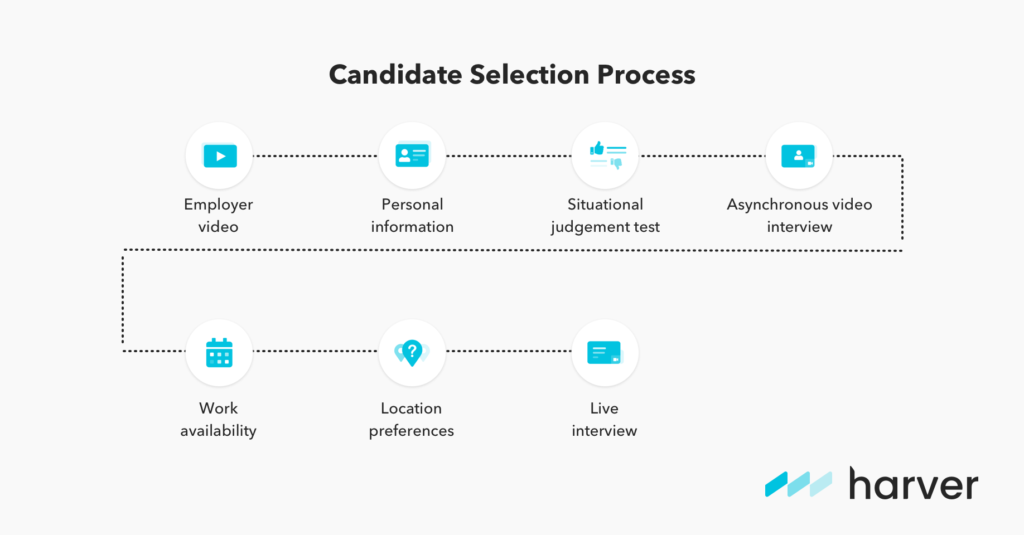What is employee retention in the hospitality industry?
Employee retention in the hospitality industry is a restaurant or accommodation’s ability to prevent employee turnover. This loss of hospitality talent can significantly prevent first-rate hospitality by harming the level and quality of customer service.
Fluctuation in demand for services and a shift in societal attitude towards eating out, going to bars, even hotel stays and holidays has had a huge impact on the already challenging situation of hiring for hospitality roles.
Pre-pandemic, the sector was well known for its extraordinarily high employee turnover rate. According to the U.S. Bureau of Labor Statistics, the annual average employee turnover rate across all industries is between 12-15%, yet in some hospitality businesses such as QSRs, they routinely experience 150% annual staff turnover. The hotel and motel industry reports experiencing a hospitality employee turnover rate of 73.8%.
In such a consumer-facing industry, having low employee retention with employees constantly coming and going can make it difficult to meet customer expectations. Not to mention it eats into your organization’s profitability when you need to constantly find, hire, and train new employees.
However, just because the turnover rate in the hospitality industry is high doesn’t mean it has to be your norm. When you’re hiring at scale, knowing what causes employees to leave allows you to do something about it.
In this article we’ll outline the current state of the hospitality industry in 2023, before delving into 8 reasons why employees are leaving (and what you can do to keep them around).
What’s in?
Like what you see?
Don’t miss out. Subscribe to our quarterly digest to get the latest TA and TM resources delivered right to your inbox.
What is employee retention like in hospitality?
Turnover rate in US hospitality industry 2023
The pandemic hit all industries hard, but none more so than the hospitality industry, with bars and clubs faring the worst, closely followed by hotels. According to the Bureau of Labor Statistics, seasonally adjusted quit rates for accommodations and food services is at 5.2%. That’s the highest quit rate across industries, dwarfing even the retail industry’s 3.2%.
Turnover rate in UK hospitality industry 2023
In the UK, vacancies for hospitality roles are at 7.9%. Why? In part, the Office for National Statistics notes that hospitality businesses have lost nearly 200,000 workers since 2019 due to Brexit.
And then there’s the tight labor market to contend with.
Hospitality turnover and retention challenges
Job vacancies in the hospitality sector have been growing quarterly and are now higher than they were pre-pandemic, with hospitality business more than twice as likely than any other business to experience recruitment challenges. These challenges add up fast, with the Center of Hospitality Research at Cornell University calculating that losing one hospitality employee costs nearly $6,000 each.
Minimum wage growth, businesses closing their doors for good, financial incentives for previous industry employees to stay at home and not venture back to work, has all led to a major labor shortage. While this tight labor market is happening across the board, it’s felt most acutely in the hospitality industry where pre-pandemic recruitment was already challenging.
As a result, the industry is showing an increased interest in robotics, contactless technology and the use of artificial intelligence where possible. For instance, AI chatbots for recruiting are common now to speed up hospitality hiring. However, not every hospitality position can be filled by technology, because in the hospitality industry personalization is key.
So what can you do to help reduce the employee turnover in your hospitality business? Well, to be able to stem the flow, you have to first understand what’s causing so many people to jump ship.
Let’s dive in.
- White paper
Before you continue!
Don’t forget to grab your free copy of our white paper on the digital transformation of restaurant volume hiring. Learn about:
- The challenges currently shaping the restaurant recruitment space
- How restaurant employers can navigate the tight labor market, and the role of technology in a future-proof recruitment process
- The four building blocks of a fully digital recruitment process

What causes employee retention issues in hospitality?
1. Unclear job expectations
Not knowing what they will or should be doing at work can be a serious source of stress for many employees. If job expectations aren’t clearly communicated beforehand, workers may decide it’s time to find a job that is more fulfilling.
Employees become unhappy when they experience misaligned expectations, i.e., they feel like the job they’re doing doesn’t align with what they thought they’d been hired for. This disconnect causes them to attrit to find a job somewhere else where they’re better suited.
During the recruitment process, it can be tempting to only show the positives of a job or try to spruce up the role to sound more appealing. This approach will only paper over the cracks. As soon as candidates realize they’ve been mis-sold or duped, they’ll quit, leaving you back at square one.
2. Disconnect with managers
When managers are unable to properly communicate with their staff, it can push employees to quit. Unfortunately, one bad manager can have serious consequences on the job satisfaction of your best employees which leads to employee turnover.
High volume recruitment leaders of hotel staff, food servers, quick service restaurant employees, and other service workers need to be able to manage both processes and humans. They need to know how to handle conflict, delegate orders, and communicate openly with both their team and customers.
3. Bad fit
Hospitality is a common job for young people to enter into. Unfortunately, it isn’t the right fit for everyone, something that most people only discover after they’ve been hired.
Not everyone has the customer service skills and traits required to deal with the customer-facing demands that often come with hospitality jobs, whether it’s in QSR, upscale restaurants, or hotels. If a new hire’s position doesn’t match their personality, or they don’t fit with your company culture, they may find that they’re unhappy with the role and ultimately leave.
4. Lack of flexibility
Employees in the hospitality industry rarely work a set schedule, and that’s a big benefit for many of them. The flexibility that comes with the job is a plus for many people who want some wiggle room in their schedule.
Unfortunately, this flexibility can also mean employees don’t know what to expect each week. If they’re unsure what their hours might be, the job may actually end up causing additional stress.
Employees don’t want to wait until the last minute to get their schedules. They also want to have some say in days they have off, times they’re unable to work, and if they’re expected to work long or overtime hours.
5. Toxic or unhealthy work environment
Excessive stress at work is one of the leading causes of employee turnover in hospitality.
The hospitality industry often has high-pressure working conditions that can leave even calm and collected employees feeling stressed out. Not everyone is suited to this kind of environment, causing high levels of turnover.
However, this isn’t the only reason the work environment may become toxic or unhealthy. 71% of female restaurant workers said they’ve experienced sexual harassment on the job.
6. Inefficient communication
Communication in business is key, regardless of industry. However, in the hospitality industry, it’s especially crucial that needs and expectations are clearly communicated between higher management and their staff.
When executives and team leaders don’t keep employees fully abreast of new regulations or processes, they can feel disengaged and unmotivated. If these customer-facing employees aren’t giving their best, it can reflect badly on the organization as a whole.
7. Lack of recognition
The hospitality industry demands hard work and often long, irregular hours, regardless of the role. Unfortunately, many employees don’t feel like their investment is noticed by upper management and executives.
When employees are constantly giving a job their all and feeling like their hard work is ignored, it can lead to feeling undervalued and unappreciated. They may also start to believe that it doesn’t matter how hard they work and instead of trying to give more, they’ll start giving less.
If employees cut corners, it is often the customers who suffer. When customers’ needs and expectations aren’t met, they may choose to go to a competitor.
8. Minimal growth opportunities
One of the biggest causes of employee turnover in the hospitality industry is the seeming lack of growth opportunities. While many individuals start out in hospitality when they’re young, not many of them choose to stay in the industry throughout their career, believing it’s a dead-end job.
Whenever someone enters a new job, advancement is going to be on their mind – and hospitality is no exception. Unfortunately, many hospitality organizations only look at their employees as part-time or seasonal workers, like when hiring for the summer rush.
When employees feel as if they’re viewed as a short-term or replaceable employees by management, they won’t want to stick around. If they don’t feel like the organization is invested in their growth, they won’t be invested in the company either.
How to retain hospitality employees
Optimize quality of hire from outset
From the very start, optimize your recruitment funnel by prioritizing where you source applicants. If you want to hire quality talent who sticks with you, make sure only the best talent enters your pipeline.
Adopt a data-driven approach to sourcing so you can easily see where your top talent is coming from, and focus your efforts on attracting them.
Leverage smart technology, like a conversational recruiting chatbot, to engage top hospitality candidates. Tools like Harver CHAT help restaurant and travel organizations engage, screen, and hire in the same day.
Manage candidate expectations
The simplest way to manage candidate expectations and improve employee experience is to be open and honest from the get go.
Make job expectations clear from the job advert and then through the entire application with realistic job previews, onboarding, and training process. Be upfront about both the positives and the negatives of the job, and make sure employees know exactly what they should be doing during each shift.

Check in with employees often to see if they have any questions or if any expectations are unclear. Be sure each employee knows who they should connect with if they have concerns or need help with their responsibilities.
Provide proper management training
People leave managers, not companies. Make sure managers are properly trained for overseeing people. Don’t just assume that because someone was a great employee they’re capable of taking on more responsibility and being leaders. Instead, have clear expectations for your hospitality managers.
Encourage two-way feedback between managers and employees. Look for opportunities to improve the overall dynamic of the workplace and push for continuous training for employees of all levels. Tip: with behavioral assessments, you can enable self-serve leadership development like UPS.
Optimize candidate selection for first-rate hospitality
Even when you’re hiring in a tight labor market you need to optimize your candidate selection and not hire just anyone who applies.
In some instances, you can train people to develop the skills they need to be successful at their job. However, it is more important that you look for the right personality characteristics during the hiring process.
Define clearly the skills and traits each new hire should have. Look for certain characteristics while you’re hiring, including multitasking and stress tolerance. If a candidate doesn’t possess the traits needed to be successful at the job, they’re likely not the right person to hire.
To find these people, take advantage of pre-employment assessments such as a cultural fit assessment, a multitasking test or personality questionnaires and situational judgement tests (SJTs) during the application process.

Incorporating these additional assessments before making a hire can help you ensure you’re putting the right candidates in your open positions.
Manage scheduling expectations
During the application process, be honest about your scheduling system. Don’t hide how your hospitality business operates. Work in the hospitality industry can involve long hours at short notice, don’t sugar coat this. Give candidates the knowledge and let them choose whether it suits them or not.
Keep a routine of when schedules will be released and when employees should expect to know what days they work. Let employees know ahead of time their expected hours and give fair warning if they might be asked to work additional or longer hours.
You should also provide a structure to request time off or a process to follow if the employee is sick the day of a shift. Having these systems in place ahead of time can give your employees comfort in knowing their needs are taken care of, while ensuring you don’t become short staffed.
Create a psychologically safe work environment
It’s important to create a work environment that your employees will actually want to be a part of and feel psychologically safe operating in. Establish clear policies that employees can follow in the event that something happens, and ensure they feel safe and protected if they choose to speak up.
Proactively create a positive work environment for all employees. Don’t stop developing a strong culture just because employees are happy and healthy. Always look for new ways to improve the workplace for your employees.
Frequently check in with employees at all levels to see how they feel about your current work environment. Ask for feedback or ideas on how you can improve and look for realistic ways you can implement them into your day-to-day operations.
Prioritize communication
You always want to have a clear line of communication across all levels. It’s also important to ensure that the communication pathway is a two-way street. Staff should be free to give feedback or voice concerns to upper management.
Give each and every employee a voice, and also an opportunity to listen. Encourage employees of all levels to speak up when they feel like there is something to discuss, but also to listen to others when they have something to contribute.
This can be challenging for larger organizations that may not have an easy way to facilitate communication between all employees. In this event, turn to an app for internal communication that can help employees share thoughts and ideas with others.
Acknowledge hard work and first-rate hospitality
Look for new ways to recognize your employees for their hard work. In some cases, even small acknowledgments can go a long way. A simple thank you or recognition during a meeting can leave an employee feeling good about the work they’ve done.
For larger accomplishments, monetary rewards or extra time off can encourage employees to keep up the good work. Develop a recognition system that motivates employees to continue to work harder.
Invest in career development programs
Develop a growth plan for all employees, even if they’re only hired seasonally or at a young age. Have a clear career path to higher positions and make sure employees know what they need to accomplish in order to get there.
You should also look to hire internally when you have open positions. While you will also want to recruit outside of your internal base of employees, foster internal mobility and let qualified candidates within your organization know that you have an open position they might be interested in.
For example, an American quick service restaurant In-N-Out Burger frequently appears on Best Places to Work lists and one of the reasons for that is their mission to promote from within. They’re dedicated to providing training and development to all their employees and it pays off – their employee turnover rate is 4-6X lower than the QSR industry average.
Next steps for increasing employee retention in hospitality
If you’re struggling to reduce employee turnover in your hospitality roles, Harver’s hospitality hiring solution could be just what your organization needs.
Book a demo below and learn how using a fast and efficient solution for end-to-end digital hiring will help you fill your organization. To deliver first-rate hospitality, you need the right employees who want to stay in their roles, reducing your employee turnover rates.
Ready to transform your hiring process?


